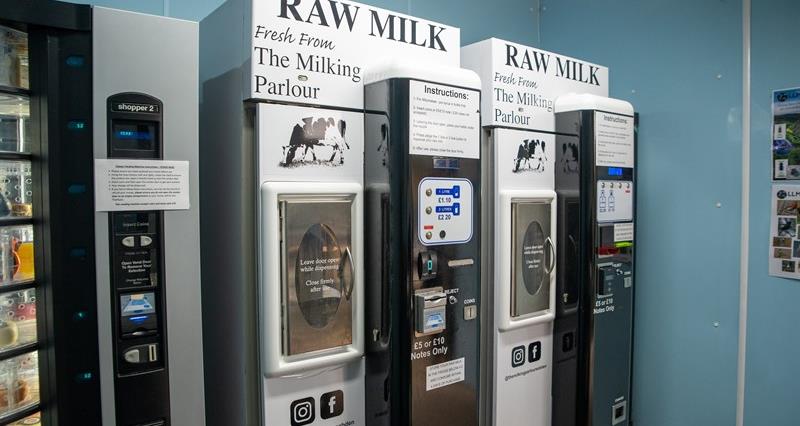With a milk price plummeting to as little as 16p a litre back in 2016, Bowland Fresh suppliers Bobbie and his son Edward Gill recognised they needed to add something to their enterprise to make it profitable.
It’s taken a lot more than luck for the small family run farm to turn things around, but the combination of a happy herd of Friesian cows, access to stunning walks around their land in Sabden, near to Pendle Hill, and a loyal customer base coming from nearby Blackburn, Burnley and Colne has resulted in a raw milk vending machine success story.
Housed in a shed they’ve named ‘The Milking Parlour’ which is at the beginning of a short circular walk that allows you to explore the Sabden Valley, are three vending machines. Two are dedicated to raw milk direct from their 100-hectare Cockshotts Farm and the third is specifically for selling cheese and butter.
For just £1.20 a litre customers can purchase the milk easily via the machines which accept both card and cash. You also have a choice between using a plastic or reusable glass bottle.
Bobbie Gill said: “Approximately 80% of our customers are Asian. They tell us our raw milk is the nearest thing they can get to Buffalo milk and that’s why it’s so popular.”
At Cockshotts Farm, the Gill family run a closed herd and also have a closed flock of Swaledales.
The idea to sell raw milk direct from the farm came one Sunday whilst Bobbie was watching BBC Countryfile. They featured Jonny and Dulcie Crickmore from Fen Farm Dairy Ltd in Suffolk who were making a success out of the niche of raw milk. Edward and his wife Nichola then travelled to the Crickmore’s farm to learn more about the process and returned to Lancashire enthused.

The Gill family of Cockshotts Farm
Edward explains: “Firstly we gained our raw milk retail licence. We have to be five times cleaner than your average dairy farm. We milk 50 cows which supply the raw milk vending machines. The rest of their milk is still sent to Bowland Fresh who have been very supportive of our new venture.
“I’ll admit it was scary. We spent £12,000 on a machine and didn’t have one customer secured when we started out in October 2016.
“Things are going from strength to strength. Eid week was phenomenal for milk sales. Our average sales change every single week. It can be dependent on things such as the weather or the number of walkers in the area.
“We introduced milkshakes in March 2021. Customers are simply asked to put 30p per pump of syrup into an honesty box.”
Edward’s wife Nichola runs the farm’s social media accounts and has amassed 6,052 followers on Facebook and 1,783 followers on Instagram.
The Gills have farmed the land since 1932 and have been milking cows there since 1950.
Edward is interested in all things World War Two related and remembers vividly asking his grandmother what the best thing about that period, for her, was.
“She described an idyllic scene in the fields around the farm which included acres of colourful wildflowers and plentiful months and insects,” said Edward.
“In her memory we’ve dedicated six acres of land on our farm to wild flowers and we now have the highest bee count in the AONB of Bowland. There are so many species of bee that can be found on the farm now.
“With the help of The Pendle Hill Landscape Partnership we’ve been busy creating new wildflower meadows by adding seeds and plug plants each year to increase the variety of species growing there. We’ve already seen a dramatic change in the wildlife since we started this process. We have also planted up old hedgerows to create wildlife corridors across the landscape.
“British wading birds are in decline due to loss of inland breeding habitat. With the help of Ribble Rivers Trust and RSPB we have improved nesting ground for Lapwing, Curlew and Redshank, which will encourage greater numbers to the area.
“Ribble Rivers Trust have also been busy improving a plot of woodland which was cleared for the Second World War effort. Although it has been partially replanted over the years, it has now been fully replanted with traditional English trees such as oak, hazel and holly, which are all great for wildlife and our carbon footprint.”
